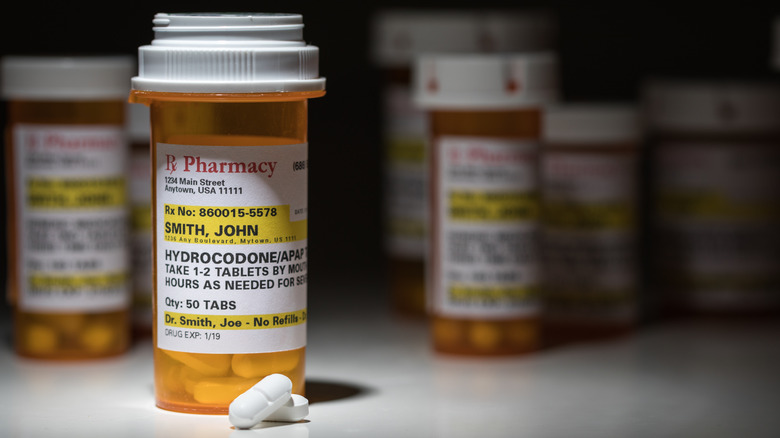Medications You Shouldn't Take With Tylenol
Containing the active ingredient acetaminophen, Tylenol is used to treat uncomfortable symptoms related to a variety of conditions, including allergies, seasonal colds, flu, fever, and more. The over-the-counter (OTC) drug is so popular, in fact, that during your average week, it's used by roughly 20% of American adults, according to 2019 research published in the British Journal of Clinical Pharmacology.
If we take a look at Regular Strength Tylenol Pain Reliever & Fever Reducer Tablets with 325 milligrams (mg) of acetaminophen, adults and children at least 12 years of age are instructed to take two tablets every 4 to 6 hours as symptoms persist (via Tylenol). No more than ten tablets should be ingested in a 24-hour period, and children ages 6 to 12 should take no more than five tablets in a day. But the maximum daily dose isn't the only warning outlined in the product details. You'll also see information about potential drug interactions. Just like with prescription medications, we should always exercise caution when it comes to mixing OTC medicines with other drugs. With Tylenol specifically, this includes other medications containing acetaminophen.
The potential risks of taking Tylenol with other acetaminophen-containing drugs
The U.S. Food and Drug Administration (FDA) emphasizes the importance of knowing exactly how much acetaminophen we're taking. Tylenol isn't the only place the active ingredient is hiding. Rather, it can be found in over 600 different drugs (via FDA), including other popular OTC cold and flu relief medicines like NyQuil or Dayquil, reports MedlinePlus. It can also be found in certain prescription pain-relief medications, such as percocet, codeine, and hydrocodone.
The maximum daily dose of acetaminophen is 4,000 mg for adults. Taking more than this amount can put one at risk for serious liver damage, overdose, or death. Acetaminophen isn't always easily identifiable on drug labels, however, so it's important to know that it may alternatively be listed as APAP, AC, Acetam, Acetamin, Acetamino, Acetaminoph, N-acetyl-para-aminophenol, or paracetamol. If you see any of these names listed on a drug label, keep track of how much acetaminophen you're taking and check with your pharmacist or doctor before taking Tylenol.
Other prescription drugs that interact with Tylenol
Patients taking warfarin should also be cautious about taking Tylenol and check with their doctor first (via GoodRx Health). Warfarin is a blood thinner that, when taken with Tylenol, may make a person more susceptible to bleeding. A tuberculosis treatment drug known as isoniazid can also negatively interact with Tylenol and make a patient more prone to liver damage. Similarly, ketoconazole, a fungal infection treatment drug, can also put one at an increased risk for liver damage if taken with acetaminophen (via WebMD). According to Drugs.com, the same is true for teriflunomide (a drug used to reduce multiple sclerosis flare-ups) as well as leflunomide (a rheumatoid arthritis treatment medication).
It is also advised that children not be given Tylenol before receiving certain vaccines. Although acetaminophen won't impact the vaccine's efficacy, it may reduce the body's immune system response. While we've outlined some of Tylenol's more potentially serious drug interactions, the OTC medication has a total list of 115 known drug interactions ranging from mild to major. Therefore, it's always best to check with your doctor if you have any questions or concerns and to keep them informed regarding all supplements, prescriptions, and non-prescription drugs you're taking.


